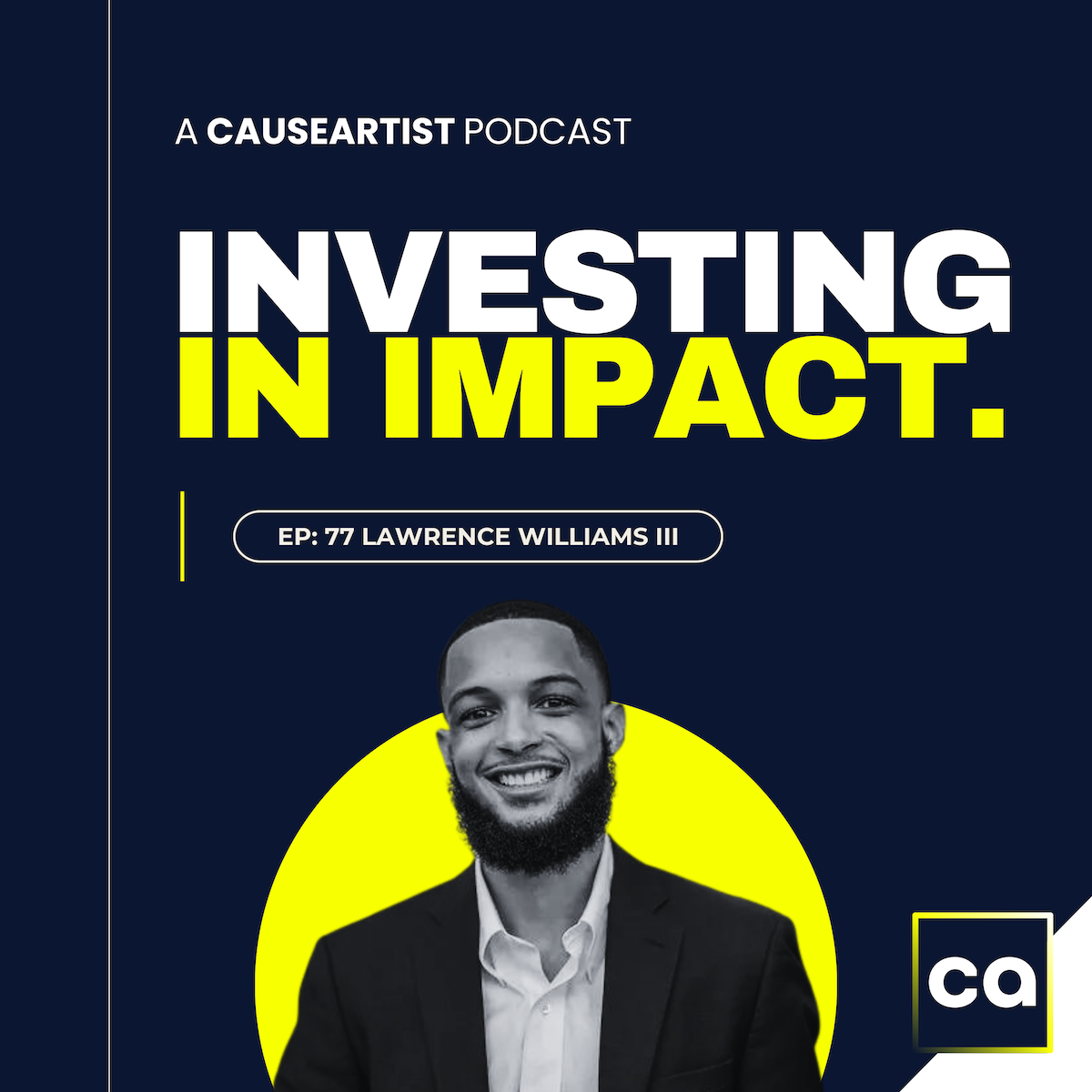Causeartist BackOffice
Your Mission-Aligned Operations Team
From investor-ready financials to growth strategy, HR, compliance, and custom software—Causeartist BackOffice is your all-in-one operational partner. Built for impact startups, funds, and nonprofits, and powered by our experts.
Let us handle the back office—so you can stay focused on impacting the world.
In episode 77 the Investing in Impact podcast, I speak with Lawrence Williams III, Partner at The De-Carceration Fund, on the fund's mission to support startups that address the challenges faced by incarcerated individuals and those reentering society.
- Subscribe on Apple Podcasts
- Subscribe on Spotify
- See past episodes.
The U.S. criminal justice system affects over 6.6 million people and costs the nation more than $80 billion per year.
The De-Carceration Fund is unique in its mission to support and invest in enterprises that directly address the failings of the U.S. criminal justice system.
The fund’s multipronged strategy includes backing companies that work in areas such as:
- Preventing Entry: Advocating for reforms in gun control, cash bail, foster care, law enforcement, and domestic violence to reduce the number of individuals who enter the criminal justice system.
- Reducing Suffering: Supporting efforts in juvenile justice, legal costs, prison programming, family support, and sentence reduction to ease the burdens placed on those within the system.
- Ending the Cycle: Addressing recidivism by promoting reform and rehabilitation that help formerly incarcerated individuals reintegrate into society and avoid re-incarceration.

Takeaways
- The De-Carceration Fund supports startups that address the challenges faced by incarcerated individuals and those reentering society.
- The fund focuses on preventing people from entering the criminal justice system, improving conditions for those currently incarcerated, and helping individuals successfully transition out of the system.
- Portfolio companies like UpTrust and Pigeonly are making a positive impact by streamlining communication and reducing pre-trial violations.
- The fund plans to expand its portfolio and continue investing in the ecosystem, with a focus on incorporating AI into solutions and developing more efficient systems.
- Private prisons have the opportunity to embrace ethical innovations and support startups that are working to improve the criminal justice system.
- The fund aims to achieve financial and societal returns by supporting startups that address the inefficiencies in the criminal justice system.
The Economics of Incarceration
The current system perpetuates a cycle of financial exploitation and human suffering. Private companies make approximately $7 billion from prison operations, with over $3 billion of that coming directly from the families of incarcerated individuals.
Each inmate costs an average of $35,000 per year, yet over half of those released return to prison within three years. This broken system not only drains resources but fails to provide meaningful solutions to reduce crime or support rehabilitation.
The indirect costs of incarceration, estimated at $260 billion annually, further highlight the deep flaws in the system. These costs ripple through society, affecting families, communities, and the overall economy.
The Opportunity for Change
The De-Carceration Fund presents an opportunity to shift the narrative around criminal justice reform. Rather than perpetuating an expensive, ineffective system, the fund’s investments focus on preventing entry, reducing suffering, and ending the cycle of incarceration.
By supporting businesses that align with these values, The De-Carceration Fund aims to create long-term, sustainable change in a system that desperately needs it.
If you’re interested in supporting ethical reform in the criminal justice system, learn more about The De-Carceration Fund and how you can get involved in its mission to bring about meaningful, systemic change.
This approach highlights the fund’s goals, its leadership, and the need for reform in the U.S. criminal justice system while emphasizing the ethical and impactful nature of their work.
Interview Transcript
[00:02.257] Grant Trahant:
Thank you so much, Lawrence, for joining me today. I’m really excited to talk about the Decarceration Fund, your journey, what the fund is up to, some of the portfolio companies, and how startups can improve the experience for our incarcerated population. Maybe we can touch on preventative measures, and how startups can help with transitions when people exit incarceration. There’s a lot to discuss. Before we dive into the mission and vision of the fund, could you share your journey and how you ended up at the Decarceration Fund?
[00:52.034] Lawrence Williams:
Of course. I like to start by mentioning that my dad was an entrepreneur and investor, and my mom was a Philadelphia police officer, so you can see how these influences might connect. I attended Howard University, where I was president of the School of Business. They were very focused on traditional career paths, like Goldman Sachs or consulting. I followed that path for a bit but got into product management in my sophomore year. I liked that product management allowed me to bridge engineering and strategy.
My first taste of that world was when I pitched a company to Kapor Capital, which was a great experience and solidified my interest. After school, I worked for Fiserv, the fintech company behind Zelle, which gave me product management and marketing experience. While I was in Atlanta working for Fiserv, I found this startup called The Moves, which was like Eventbrite but with a social media component. They needed a chief product officer, so I joined them while still working at Fiserv.
[03:02.553] Grant Trahant:
Nice, that’s a lot to juggle.
[03:05.934] Lawrence Williams:
Yeah, that was one of my most efficient periods, for sure. After about a year, I became the CEO of The Moves, and we eventually had a successful exit. That momentum pushed me to look for new opportunities. Without a concrete idea of my own, I went to work for one of the investors, KiwiTech, which is a tech-for-equity accelerator. I became their head of investing for the East Coast, managing demo days and investments in cities like DC, Philly, New York, and Atlanta.
When 2020 hit, I had to adapt, and I moved back to Philadelphia. That’s when I stumbled upon Social Venture Circle, a group of impact angel investors, which led me to Chris Bentley, my partner in the Decarceration Fund. Around that time, I also started a nonprofit, Student Impact Capital Sourcing Program, aimed at helping students work with impact startups to quantify their social impact and find sources of capital.
[05:11.226] Grant Trahant:
That’s impressive. How did you and Chris decide to start the Decarceration Fund? Was there anything like this already in the space?
[08:31.43] Lawrence Williams:
At the time, no one was specifically focused on this space, which is what caught Chris and my attention. Our first investment was in a company called UpTrust, which streamlines communication between public defenders and defendants, aiming to reduce pretrial violations. They also expanded into probation and parole. Pretrial violations are a huge issue—70% of people on probation are re-arrested for minor technical violations like missing a meeting. UpTrust has reduced that by 50%. It was our first exit and validated our decision to create the fund.
After that, we realized there was much more potential, and what started as a pilot fund has now grown into something much larger. We’re now looking at raising $10-15 million for our first official fund. Another early investment was Pigeonly, a platform that reduces the cost of inmate communication, allowing people to send photos and messages at a much lower cost than traditional systems. These kinds of disruptions are what we focus on.
[11:41.829] Grant Trahant:
Did you consult with your mom when you were thinking about taking this leap? Given her experience, I imagine she had a lot of valuable insights.
[12:39.534] Lawrence Williams:
Absolutely. My mom was a Philadelphia lieutenant for 27 years, and before that, she earned her PhD in psychology. She has a unique perspective on the system. One of the things she highlighted was the communication gap—there’s often a lack of empathy and clarity in how the system deals with people. Solving for communication and making things more efficient can create better outcomes.
For example, when you solve for communication through platforms like UpTrust or Pigeonly, you start reducing unnecessary violations and fostering better relationships between incarcerated people and their families. My mom has always supported the idea of using technology to increase communication and transparency in the justice system.
[15:25.433] Grant Trahant:
It must be fascinating to have those conversations with her. I was struck by the statistics on your site: the U.S. spends $80 billion a year on the criminal justice system, with over 2 million incarcerated citizens. Those are staggering numbers. Did you realize the scale of this issue when you first started diving into it?
[16:43.246] Lawrence Williams:
I didn’t grasp the full scale at first. I started thinking about it back at Howard University. I began to question whether what I saw there reflected the broader population and started thinking about the prison industrial complex. Then, when Chris and I did due diligence on UpTrust, I saw that we could actually do something to address the inefficiencies. That’s when I realized that there’s a huge opportunity to do good while also creating sustainable businesses.
I wanted to use my knowledge and skills for good. After reflecting on everything I’d learned and experienced, I saw this as the right opportunity at the right time.
[19:55.353] Grant Trahant:
You mentioned private prisons earlier. They’re a controversial topic, and people have mixed views. What has been your experience with that part of the ecosystem? Do they have a role to play in your work?
[20:59.594] Lawrence Williams:
It’s a complex issue. Private prisons have not had the best track record, but we recognize that they’re not going away anytime soon. We believe they have the potential to embrace ethical innovations and reforms. It’s up to us, through the Decarceration Fund, to create opportunities for evolution by supporting startups that can challenge the status quo.
If private prisons want to support these innovations and buy into solutions that come from those who have experienced the system, that’s something we’re open to. But treating incarceration like a real estate investment trust (REIT) is something that needs to change.
[23:19.795] Grant Trahant:
I agree. Looking at the government’s inefficiencies in managing an $80 billion system, is there an opportunity for startups in your portfolio to work alongside the government to improve their processes?
[25:21.262] Lawrence Williams:
Yes, absolutely. Our focus is on three areas:
1. Preventing people from entering the criminal justice system,
2. Reducing suffering and costs for people and families while they’re in the system,
3. Increasing the likelihood of successful reintegration after release.
We have companies like UpTrust working on preventing pretrial violations, and Untap Solutions (formerly ConConnect) helps the formerly incarcerated find jobs and build professional networks. Then, there’s Pigeonly, which lowers the cost of communication for incarcerated individuals and their families. We’re also exploring startups that could help the government improve its efficiency.
[29:25.677] Grant Trahant:
That’s really interesting. To wrap up, what are some of the goals for the Decarceration Fund in the next few years?
[30:50.146] Lawrence Williams:
We’re exploring how AI can help solve complex problems more quickly, especially in this space. Currently, we have eight investments, including UpTrust, Untap Solutions, Pigeonly, Working Fields, Good Call, and TurnSignal. We’re aiming to grow that number to 14 or 16 investments in the next couple of years. We’re also looking at launching a second fund and continuing to develop the ecosystem.
Our goal is to support talented founders who have experienced the criminal justice system and are building innovative solutions to create positive change. We want to make sure that the momentum from 2020 continues and that these solutions get the support they need.
[32:41.797] Grant Trahant:
That’s amazing. It’s clear that if you succeed, it could lead to both financial returns and significant societal impact. Best of luck to you and the team, and thanks so much for taking the time today!
[33:14.744] Lawrence Williams:
Thank you so much, Grant. I appreciate it.








